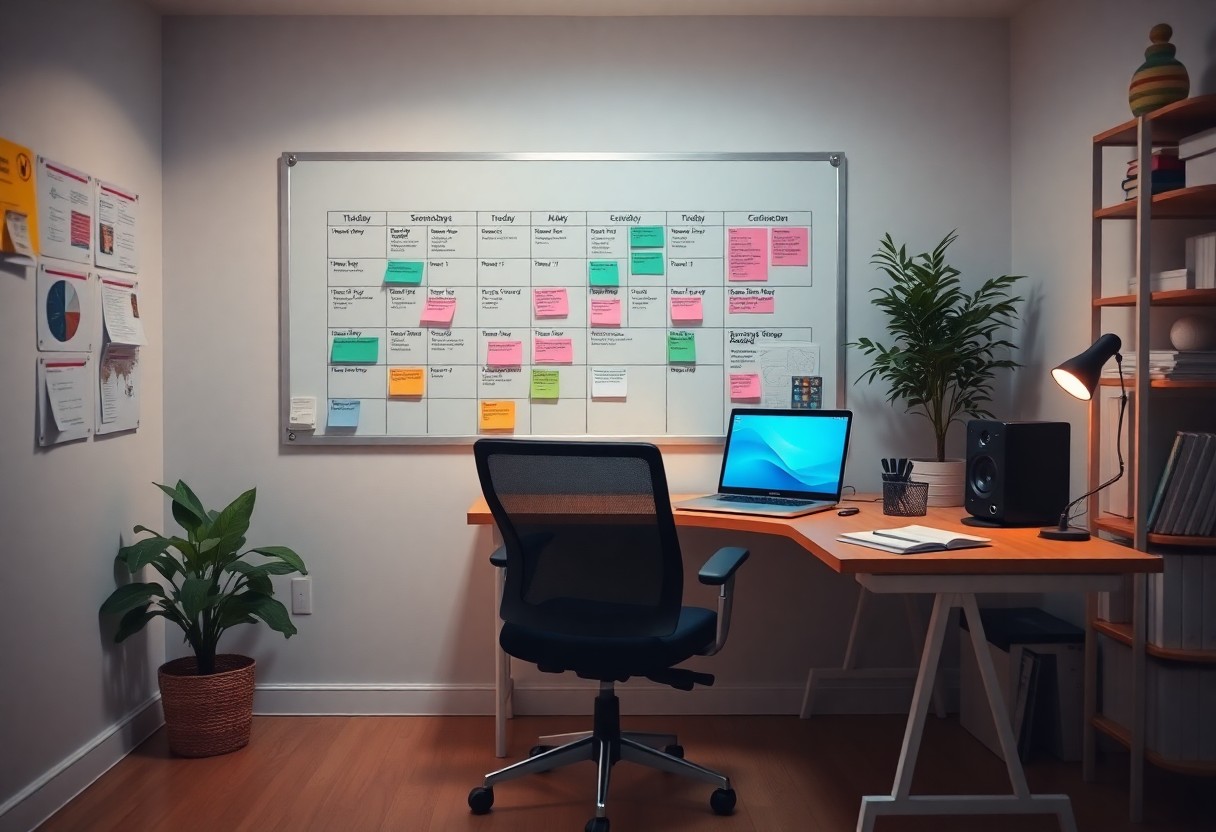Many students struggle with balancing their academic workload and exam preparation. To enhance your productivity and reduce stress, implementing effective time management strategies is imperative. Prioritizing tasks, setting specific study schedules, and utilizing tools like timers can significantly improve your efficiency. By developing these habits, you not only prepare better for exams but also create a healthier study-life balance. Embrace these time management hacks to maximize your potential and achieve your academic goals.
Key Takeaways:
- Prioritize tasks using a to-do list, categorizing by urgency and importance.
- Utilize a planner or digital calendar to schedule study sessions and deadlines.
- Implement the Pomodoro Technique by studying in focused intervals followed by short breaks.
- Set specific, achievable goals for each study session to maintain focus.
- Avoid multitasking; concentrate on one task at a time for better retention.
- Limit distractions by creating a dedicated study space and using apps to block distracting websites.
- Review material regularly instead of cramming to enhance long-term retention.
The Art of Prioritization: Mastering Your To-Do List
Effective prioritization transforms your to-do list from a chaotic collection of tasks into a structured plan for success. Start by identifying tasks that impact your academic performance and personal goals. Utilize a mix of categorization strategies, including urgency and importance, to ensure you focus on what truly matters. This systematic approach not only enhances productivity but also reduces stress, allowing you to tackle your workload with confidence.
The Eisenhower Matrix: Distinguishing Urgent vs. Important
The Eisenhower Matrix offers a framework for categorizing tasks into four quadrants based on urgency and importance. Place tasks that are both urgent and important in the first quadrant, addressing them immediately. Tasks that are important but not urgent belong in the second quadrant, allowing you to plan time for them. Quadrants three and four include urgent but not important tasks and non-urgent, non-important tasks, which can often be delegated or eliminated. This method ensures you’re engaged in work that advances your goals.
Time Blocking Techniques: Allocating Resources Wisely
Time blocking segments your day into defined periods dedicated to specific tasks or activities, optimizing your focus and efficiency. By allocating resources wisely, you manage distractions and enhance concentration. Create blocks for study sessions, breaks, and personal activities, ensuring a balanced schedule. This technique fosters a rhythm that aligns with your natural productivity patterns, leading to sustained focus and improved performance.
To implement time blocking effectively, begin by assessing your daily and weekly commitments. Allocate longer blocks of uninterrupted time for challenging subjects or projects, typically during your peak focus hours, while using shorter blocks for quick tasks. For instance, designate 90-minute sessions for studying complex topics, followed by a 15-minute break. Using tools like digital calendars can help visualize your blocks, ensuring you stay on track and adjust as needed. This structured approach not only enhances productivity but also promotes a healthier work-life balance.

The Science of Scheduling: Crafting Your Study Routine
Effective scheduling transforms your study approach, enabling you to allocate time wisely and maximize productivity. By organizing study sessions around your most productive hours, you create a personalized routine that caters to your unique learning style and daily energy peaks. Integrating short breaks and varying subjects within your schedule can enhance retention and keep motivation high. The key is flexibility; be ready to adjust your plan as necessary while maintaining consistency in your study habits.
Pomodoro Technique: Short Bursts of Focus
The Pomodoro Technique enhances focus through timed work sessions, typically lasting 25 minutes, followed by a 5-minute break. This method prevents burnout and promotes sustained concentration, making daunting tasks more manageable. After four pomodoros, take a longer break of 15 to 30 minutes. This structured approach helps you break down larger study goals into achievable smaller chunks, thus boosting productivity without overwhelming yourself.
Daily and Weekly Planning: Long-Term Vision
Long-term planning aligns your daily activities with your overall academic goals, ensuring consistent progress throughout the semester. Craft a detailed weekly agenda that includes specific topics to study each day, deadlines, and time for revision. A well-structured daily routine allows you to prioritize tasks, allocate sufficient time for each subject, and adjust focus based on upcoming exams or projects.
Utilizing tools like digital planners or bullet journals can further enhance your planning process. Mapping out your study sessions week by week provides a visual roadmap that highlights your progress and keeps you accountable. Incorporate review sessions into your weekly agenda to solidify knowledge. Studies show that students who engage in consistent review tend to retain information better, resulting in improved exam performance and reduced stress before test day.

Digital Allies: Leveraging Technology for Efficiency
Integrating technology into your study habits can significantly boost your productivity. With various digital tools at your disposal, you can streamline your study processes, manage your time effectively, and enhance your learning experiences. Embracing these innovations allows you to stay organized, motivated, and on track with your academic goals, ultimately making your exam preparation more manageable and less stressful.
Productivity Apps: Tools for Tracking and Organizing
Productivity apps like Trello and Todoist help you create detailed task lists, set deadlines, and track your progress. These tools allow you to break larger projects into smaller, manageable tasks, providing a visual roadmap of your completion timeline. Utilizing reminders and notifications keeps you accountable, ensuring you stay focused on your study goals.
Online Resources: Where to Find Study Aids and Guides
Many online platforms offer comprehensive study aids and guides that cater to various subjects and learning styles. Websites such as Khan Academy, Quizlet, and university resource pages provide tutorials, flashcards, and practice quizzes. These resources not only consolidate your understanding but also offer a wealth of information at your fingertips, enhancing your exam-preparation strategy.
Online resources have transformed how students access study materials. Sites like Coursera and edX feature courses from leading universities, allowing you to deepen your knowledge at your own pace. Additionally, forums such as Reddit and study groups on Facebook foster collaborative learning, letting you discuss concepts with peers and gain different perspectives. Utilizing these platforms can enhance your understanding and retention of course material, making your study sessions more effective.

Boosting Retention: Optimizing Your Study Environment
Establishing a conducive study environment can significantly enhance your retention capabilities. A well-organized area free from clutter allows you to focus on the material at hand. Consider incorporating elements that inspire you, such as motivational quotes or calming colors. Additionally, ensure that your space is adequately lit, as proper lighting can keep you alert and engaged during study sessions.
The Role of Space: Designing Your Ideal Study Area
Your study area should reflect your personal preferences and learning style. Prioritize a comfortable chair and desk, as well as access to necessary resources. Personal touches like plants or artwork can create a welcoming atmosphere that fosters creativity. Regularly assess your space to ensure it remains inviting and organized, minimizing stress and promoting effective study habits.
Minimizing Distractions: Techniques for Enhanced Focus
Creating a distraction-free zone is vital for maintaining focus during study sessions. Begin by silencing notifications on your devices and using apps designed to limit access to distracting websites. Set specific times for breaks to prevent burnout, allowing your mind to refresh and refocus. Designate a quiet space, perhaps a library or a designated room, where interruptions are minimal.
Implementing these distractions techniques can significantly improve your concentration. Research shows that students who study in environments with fewer distractions score, on average, 15-20% higher on exams. Techniques like the Pomodoro Technique, where you study for 25 minutes and then take a 5-minute break, enhance focus and retention. Use noise-canceling headphones or ambient sound apps to drown out background noise, and try to establish a consistent study schedule, signaling your brain to be in “study mode” during those times. Creating this structured environment allows you to absorb information more effectively and efficiently.
Last-Minute Strategies: Preparing for Exams Like a Pro
As exams approach, a focused and strategic approach to review can maximize your performance. Prioritize understanding over memorization; work through summaries and key concepts instead of cramming. Allocate specific times for each subject, and use mini-reviews to avoid burnout. Engage with peers for quick discussions on difficult topics to reinforce your knowledge. Also, keep the exam content accessible, ensuring you can revisit them efficiently. With the right techniques, you can convert last-minute jitters into productive preparation.
Quick Review Techniques: Active Recall and Spaced Repetition
Utilize active recall by testing yourself on the material instead of passively reading. Create flashcards or take quizzes that require you to retrieve information without prompts. Incorporate spaced repetition by revisiting topics at increasing intervals, which solidifies memory and enhances retention. Aim to space your reviews over days or weeks, aligning them with your exam schedule to maximize efficacy.
Stress Management: Keeping Calm Before the Big Day
Effective stress management techniques, such as deep breathing and visualization, can greatly enhance your performance. Visualize success in the exam room to build confidence, while taking deep breaths can help calm racing thoughts. Engaging in light physical activity, such as stretching or walking, can also reduce anxiety. Prioritize sleep in the days leading up to your exam for better cognitive function and focus.
Incorporate relaxation exercises into your daily routine, such as meditative practices or yoga, which have proven benefits on reducing anxiety levels. Adopting a balanced diet is equally important; foods rich in omega-3 fatty acids, antioxidants, and whole grains can fuel your brain for peak performance. Additionally, having a clear plan on exam day, including knowing your test location and materials needed, can alleviate last-minute panic and ensure you approach the exam with clarity and readiness.
To wrap up
The effectiveness of your time management directly influences your academic success and exam preparedness. By implementing strategies such as prioritizing tasks, setting specific goals, and utilizing tools like calendars and timers, you can enhance your productivity. Additionally, incorporating breaks into your study sessions helps maintain your focus and motivation. Consistently applying these hacks not only reduces stress but also optimizes your study efforts, allowing you to approach exams with confidence and clarity.
FAQ
Q: What are effective time management techniques for students?
A: Techniques include prioritizing tasks, using the Pomodoro Technique (25 minutes of focused work followed by a 5-minute break), creating a daily schedule, and setting specific goals for each study session.
Q: How can students minimize procrastination while studying?
A: Students can minimize procrastination by breaking tasks into smaller, manageable chunks, eliminating distractions, setting deadlines for each segment, and using productivity apps to track progress.
Q: What role does goal setting play in exam preparation?
A: Goal setting helps students clarify objectives, focus their study sessions, and track progress, making it easier to stay organized and motivated throughout the preparation process.
Q: How can students effectively use a planner for their studies?
A: Using a planner allows students to write down deadlines, prioritize tasks, schedule study sessions, and track important dates, ensuring they stay on top of their assignments and exam preparation.
Q: What strategies can be used for balancing study time and personal life?
A: Strategies include setting specific study hours, establishing boundaries around personal activities, using time-blocking techniques, and ensuring regular breaks to recharge and maintain a healthy balance.
Q: How can students evaluate their time management effectiveness?
A: Students can evaluate effectiveness by reflecting on completed tasks at the end of each week, assessing whether they met deadlines, identifying areas for improvement, and adjusting their strategies accordingly.
Q: What are some quick tips for last-minute exam preparation?
A: Quick tips include reviewing key concepts, practicing with past exam papers, forming study groups for discussion, staying hydrated, and ensuring sufficient rest the night before the exam.
